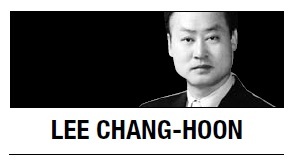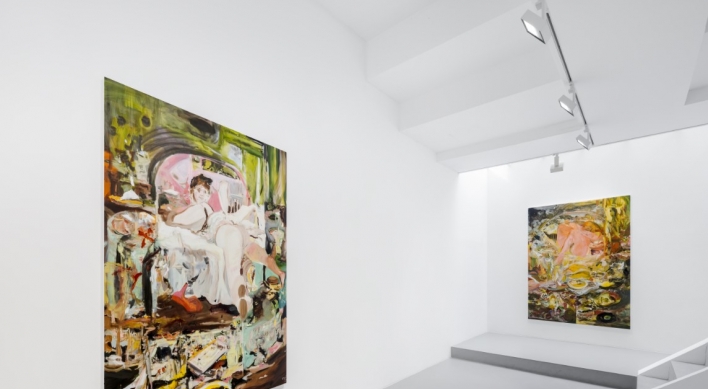 In the winter of 2016-2017, a neologism made its way in the Korean politics, the “Pompidou phenomenon.” Briefly put, this neologism is far-fetched and rather illogical. The so-called “truth” aspiring to hide behind splendid rhetoric easily reveals its true colors once the husk has been peeled off.
In the winter of 2016-2017, a neologism made its way in the Korean politics, the “Pompidou phenomenon.” Briefly put, this neologism is far-fetched and rather illogical. The so-called “truth” aspiring to hide behind splendid rhetoric easily reveals its true colors once the husk has been peeled off.
The “Pompidou phenomenon” refers to the victory of the French ruling party candidate, Pompidou, in the 1969 presidential elections held after De Gaulle offered his resignation in the wake of the “Revolution of 1968.” However, much as one would wish to christen these events as a “Pompidou phenomenon,” this does not fit the reality.
Pompidou appears to have won for the following reasons. First, the French economy between the end of World War II and the first oil crisis of 1973 registered fast annual growth rates of anywhere between 5 percent and 8 percent.
The per-capita GDP during this period grew almost 15-fold, which made the French feel ever wealthier. No wonder this period is referred to in French history as “the glorious 30 years!”
Second, although the students were in clear conflict with both the older generation and their establishment, the “Revolution of 1968” did not challenge De Gaulle’s leadership. This was not just a result of De Gaulle’s heroic war past, it was also the result of his ability to resolve the nagging problems of France’s colonial past in countries like Algeria, and to find a way out of the dilemma presented by the confrontation between the US and the Soviet Union by sticking to a neutral, independent diplomatic policy and by setting an example of clean politics in general. While being President, he went to the Elysee only for work, while commuting there from his home, thus separating the public and the private areas of his life.
Third, Pompidou’s originality was his fate. Twenty years younger than De Gaulle, Prime Minister Pompidou led reforms that earned him widespread support from the nascent middle class. Exploiting the image of “Little De Gaulle,” Pompidou also found a way into the hearts of the provincial voters.
In those times there was no SNS, the transportation and communication services were significantly less developed compared to modern days, and the popular sentiment differed greatly between Paris and the provinces. While as a result of the “Revolution of 1968” Paris was swirling with all kinds of new ideas, in the provinces most people were preoccupied with disorder caused by labor-related disputes.
Fourth, the right-wing party won in the general election in the aftermath of the “Revolution of 1968,” having already dominated the parliament. Composed of the Socialist and Communist parties, the opposition was divided, increasingly experiencing shortage of talent. It took 10 years before Francois Mitterrand, someone with a certain charisma, was capable of uniting the opposition forces.
So the “Korean candle revolution” sweeping through the country does not really resemble France’s “Revolution of 1968.” The red flags have been up for the Korean economy for a long time, while 2017 appears to have even more troubling signs in store.
However, the candle lights do not appear only in response to the economic troubles. These candle lights are blaming the collapse of Korean leadership evidenced by the main culprit President Park Geun-hye’s policies that brought about the current economic failures, but also by the associated wrongdoers such as the senior officials of the Blue House and the Cabinet. Can a novel leader like Pompidou appear among those associated wrongdoers?
These candle lights symbolize a self-propelling resistance to the government monopolies, incompetent diplomacy, economic failures, a widening gap between the rich and the poor, the feudal society wrought with the abuse of power, the lies of the leadership, the hypocrisy and impotence of the deep-rooted evil permeating the country.
In this way these candle lights transcend the mere criticism of the old system and incumbent establishment. Apart from that, they are striving to maintain their sense of class and dignity by suppressing their pent-up anger, shame, and misery.
The “Agora” of direct democracy whose origin is impossible to trace in the world history is spreading its wings in Korea, making foreign media compete to praise these events as evidence of “Korea’s great potential.” Pope Francis’ blessing of Korean democracy is part of the candle lights’ image, the one embracing support of and hope for the future.
It is imperative to rein in all those who are attempting to popularize the “Pompidou phenomenon” in order to ensure popular support for the ruling party’s candidate, hoping that the nation, in a state of great unrest, holding candlelight vigils, will ultimately crave stability, thus succumbing to making the “right choice.”
The sincerity of the candle lights should not be degraded. Those who would like to question this sincerity are prostituted political technologists.
This is not the right time to argue the pros and cons of the ruling versus the opposition party candidate winning this year’s presidential election. It is the right time to meditate on the sincere spirit of the candlelight vigils in order to create a new and just future.
By Lee Chang-hoon
Lee Chang-hoon, a former president of Halla University and Veolia Water Korea, is now the president of the Seoul ASEM Institute for International Relations and the representative for Korea of the French ports of Le Havre-Rouen-Paris called HAROPA. Lee holds a doctorate from the University of Paris X. He can be reached at leech771@seoulasem.com. — Ed.
- [Photo News] Korea-Arab Society unveils logos for Oman, Qatar ties with Korea
- [Photo News]Ausbildung Graduation
- [Contribution] Celebrating 32 years of Tajikistan-Korea friendship
- Creditors of Taeyoung E&C approve capital reduction plan
- S. Korean, Australian defense chiefs agree to bolster defense industry ties
- Splashy 'The Great Gatsby' musical marks first Broadway adaptation, producer Shin's dream come true
- Cecily Brown at Gladstone Gallery in Seoul shows artist's fight against herself
- S&P keeps 'AA' rating on S. Korea with stable outlook
- National Orchestra of Korea to savor tunes and wine in outdoor concerts
- New talk show 'Verse1 with 2Jang' takes it to the streets




![[Grace Kao] Hybe vs. Ador: Inspiration, imitation and plagiarism](http://res.heraldm.com/phpwas/restmb_idxmake.php?idx=644&simg=/content/image/2024/04/28/20240428050220_0.jpg&u=)

![[Herald Interview] Mom’s Touch seeks to replicate success in Japan](http://res.heraldm.com/phpwas/restmb_idxmake.php?idx=644&simg=/content/image/2024/04/29/20240429050568_0.jpg&u=)


![[News Focus] Lee tells Yoon that he has governed without political dialogue](http://res.heraldm.com/phpwas/restmb_idxmake.php?idx=644&simg=/content/image/2024/04/29/20240429050696_0.jpg&u=20240429210658)








![[Today’s K-pop] Seventeen sets sales record with best-of album](http://res.heraldm.com/phpwas/restmb_idxmake.php?idx=642&simg=/content/image/2024/04/30/20240430050818_0.jpg&u=)